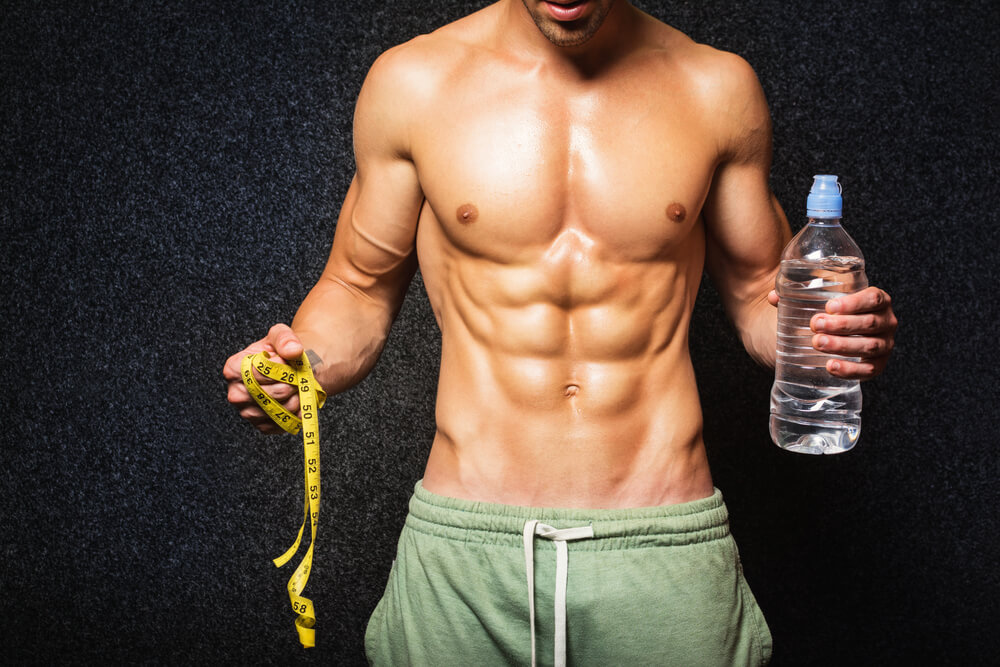
Wondering How to Lose Water Weight? Today we’ll cover everything you need to know.
Most have of us have been there – doing great on a diet or fitness plan, going full steam ahead and…just like that, it’s gone.
What gives?
Why aren’t the numbers on the scale going down anymore? And why does this sometimes last for weeks at a time?
This unpleasant encounter is known as plateauing. And it sucks. A lot. Usually, they occur from either (accidentally) not getting enough exercise or eating too much.
But no need to panic just yet.
There are a few different diet and exercises you can do to get rid of this annoying problem. Chances are you need to lose water weight.
Another cause of this stagnate weight loss is water weight. You might be asking yourself, What is water weight?
Well before we answer that question, we’ll say this – it’s a lot more likely to happen to women than men, because of fluid retention that goes along with their menstrual cycles. Sorry, ladies.
What is Water Weight and What About Water Retention?
If you aren’t really sure what water retention is or how you can fix it, it can really mess with your schedule. First of all, if you aren’t losing weight, you might step up your exercise intensity and decrease your calories even more.
Remember, at the end of the day, creating a caloric deficit is the key to losing weight.
Because, after all, this is the easiest way to see those numbers on the scale drop even more, right? Right…unless water retention is the problem, in which case, these 2 things can actually make it worse.
Excess water retention can leave you stuck when it comes to weight loss.
So what is the right play?
Do you give up and turn to the food you’ve been avoiding or cutting, because hey, who cares? You aren’t losing weight now. And so begins the vicious cycle of losing weight and gaining it back.
Learning more about how to lose water weight and what exactly it is can help you avoid this super frustrating cycle.
If things ran perfectly, we would be able to lose weight in a clean, regular fashion. We could just do our exercise, eat our meals, and every morning, grow leaner. In fact, you might even have a 6—pack one day.
If only.
Weight loss can be a roller coaster ride, with ups and downs, 3 pounds lost, 2 gained. So where does it come from?
Let’s say that in 7 days, you lose 1 pound of fat. These results can be buried when you look in the mirror or step on the scale because of an annoying pound of water your body refuses to let go of.
Now, you want to focus on how to lose water weight fast.
There are a lot of different factors behind what causes water retention. One of those is just simply the amount of water you ingest during the day or sodium.
Unfortunately, even just being in a caloric deficit is enough to cause water retention for some people.
This happens because cutting back on calories also means cutting back on cortisol levels, so the fluid retention begins.
What Does Science Have to Say About How to Lose Water Weight?
In fact, water retention isn’t something that’s a totally new discussion. Back in World War II, there were some experiments conducted in order to see how this whole thing worked. One of the experiments, called the “Minnesota Starvation Experiment” showed some pretty impressive results. Dr. Ancel Keys worked with 36 men who volunteered to a partial-starvation diet.
Now, we aren’t talking no food at all. The men were given 1,500 calories every day for half of a year.
What’s the whole point behind this? Researchers wanted to see how starvation affected not just the psychology of people, but the physiology too. Plus, they wanted to help out war prisoners. See, soldiers who were taken prisoners during the war, and were later freed, had a difficult time adjusting back to their normal diets.
So the experiment was also carried out in hopes of discovering a more solid regimen to get these starving war prisoners back to not only their normal diets, but also their metabolic functions and processes.
Needless to say, there was a lot of information found. One particular observation was extremely interesting.
In the beginning, weight loss was extremely evident. On average, the men lost two pounds weekly, every week.
However, after a few weeks, the weight loss started going all over the place.
Sometimes, the men would go weeks without a drop in their weight.
The one thing that did increase?
Their water retention.
Then, shortly after, a large spurt of weight loss would happen – almost as if water in their bodies was suddenly dispensed.
Now, of course, the whole cutting back the calories had a huge impact on the level of fat down in the men’s bodies. However, regardless of this fact, the decrease in the total amount of body weight were usually balanced by a jump in water retention.
The additional amount of water would just abruptly flood out of the body, therefore resulting in a surprising amount of weight lost literally overnight.
If you’re a bodybuilder, you might be familiar with this process. It’s often referred to as the whoosh effect.
So how did the whole ‘whooshing process’ start with the soldiers?
For some of them, it would happen randomly or for seemingly no reason at all. As for others, it could be because of a big calorie increase in a delicious meal.
You might be wondering how the heck a soldier volunteering to only eat 1,500 calories a day would get to eat a ton of calories.
Researchers were a few steps ahead of us there. They decided to celebrate the experiment with a little experiment of their own. Halfway through the experiment, they celebrated…by feeding the volunteers a 2,300 calorie meal.
And what they observed that night was nothing short of amazing. All throughout the night, a large chunk of the volunteers got up to pee.
When they weighed the men again in the morning, a vast majority of them were several pounds less than what they had weighed the day before.
Confused? Stick with us.
You might end up having a similar experience if you switched to a really lean diet, like 7% and under for men and 15% or less for women. After you’ve had yourself a delicious meal, you might have experienced the whooshing for yourself. If you’re shaking your head and wondering how this is even possible, try it for yourself. It’s pretty common for your body to keep dropping the pounds long after you’ve past the goal you’ve been waiting for.
It can even continue after you’ve upped your calorie intake again. We know this is true because this is something else the Minnesota Experiment proved as well.
Anyway, back on track. What do we do about all this?

Wondering How to Lose Water Weight Fast?
Let’s say the scale just isn’t moving for weeks at a time. And you’ve tried everything – and we mean everything:
- Weighing your food before you eat it,
- Making sure you’re getting a lot of exercise and keeping activity levels high,
- Getting Enough Sleep, etc.
If you’re doing all of this, and you’re already in a caloric deficit, but the scale isn’t moving, one cause could be water retention. Luckily, there are a few things you can do to lose water weight.
Lose Water Weight Tip 1: Try cutting back on your intake of sodium
If you go above your usual daily level of sodium, there’s going to be an increase in water weight. So on the other hand, if you go below the normal amount, there’s going to be a drop in water weight. This is the way you can activate a “whoosh” effect.
This means you have to avoid things like deli meat (which is jam-packed with sodium), canned or packaged foods, and check out sauces and salad dressings before you eat them. Of course, you can also cut back on your use of salt and certain spice blends.
Did you know cheese is pretty high in sodium?
We get that it’s kind of annoying to have to keep track of another food item in your diet. But if it means getting those numbers on the scale down again, and it’s what you need to do to lose water weight fast, isn’t it worth it?
According to The American Heart Association, the average adult should aim to consume less than 1,500 mg of sodium each day.
While that might sound like a lot, some soups and various other package foods have triple that amount! Stay educated and read ingredient labels to know exactly what you’re eating.
Lose Water Weight Tip 2: You might be sick of hearing it but drink more water
It sounds counterproductive, but it’s not. In fact, drinking around 1 gallon of water a day keeps your fluid retention regulated as you continue to lose water weight that you don’t need. Not to mention, when you don’t have enough water, your kidneys are negatively affected.
If your kidneys don’t get enough water, your liver gets all screwy, so it halts doing one of its most important jobs – burning up the fat.
Plus, if your body doesn’t have all of the fluid it needs in order to get rid of waste, you’re going to be left feeling bloated and fat. Not a good combination when your goal is to lose water weight.
As if you needed more of a reason to drink more water, remember one simple thing.
Drinking more water increases your metabolism. A stoked metabolism means you lose water weight.
It’ll also help with constipation issues. But don’t grab that gallon jug and start downing it just yet. You should take sips throughout the entire day, not chug it all down in one sitting. Drinking an entire gallon of water doesn’t give the body what it needs because that overwhelming amount of fluid is going right to your bladder, so your body doesn’t get to absorb as much as it would during smaller, more frequent sips.
Space out your hydration for maximum efficiency in absorption and use by your body.
If you feel like you can’t stand another sip of water, turn to fruits to get some more. Most fruits are also full of water. You lose water weight that you don’t want when your hydration levels are optimal.
Try these fruits to boost hydration and get a healthy snack:
- blueberries,
- watermelon,
- oranges,
- cantaloupe,
- grapes,
- and pineapple
All these have super high levels of water content. Even yogurt has high water content. Added bonus: since it’s full of probiotics, and helps good bacteria grow in the stomach, it’ll get rid of any bloating or gas problems you might be dealing with.
Your Cortisol levels might also be out of wack, so you’ve got to get them back on track if you want to continue to lose water weight. One way to do this – cutting down on exercise. When you exercise, your cortisol levels increase. So if you’re doing this while you’re restricting calories, there’s going to be high levels of cortisol within your body.
All you have to do is cut down on how often – and how hardcore- you exercise for a week or so to get everything balanced again and lose water weight.
That’s not an excuse to stop exercising, but if you’re experiencing a plateau, cutting back for a short time may balance you out.
While we’re on the subject, take a look at your diet and make sure your caloric deficit isn’t too intense. By boosting yourself up to a five hundred calorie deficit, you’ll be able to bypass all the negative cortisol problems and complications.
And as we said earlier, make sure you’re getting enough sleep if you want to lose water weight.

Lose Water Weight Tip 3: Take some time to relax every day, whether that means yoga, drinking tea or just listening to music you love. Relaxation cuts back on cortisol levels and helps you lose water weight.
You can also turn to foods that are high in fiber and potassium.
So that means eat a nice bowl of oatmeal with milk, raisins, and banana mixed in. Both cold and hot cereals that are packed full of fiber can help with constipation as well, so you’ll be eliminating that awful bloating feeling. However, don’t go overboard with this either.
Adding too much fiber into your diet too quickly will also result in bloating.
Don’t forget, even hydration throughout the day. This goes for any diet.
Conclusion
Lastly, eat! You read that right – we said eat to lose water weight! Cheat meals, including carbs, can help cut down on cortisol levels. Keeping cortisol levels in balance is an important lesson in how to lose water weight.
So don’t beat yourself up if you go off your path a little bit. The best thing you can do is stay motivated and realize that one cheat meal isn’t going to kill you. In fact, it might even help you. Having a sudden surge in calories is enough to cause that “whoosh” of water you need to get out of your system and lose water weight fast.
Remember, everything in balance. A cheat meal will help, a cheat week will derail you. Staying hydrated, managing stress/cortisol levels, and avoiding major shifts in diet or volume of consumption are your best bets when you want to lose water weight.
-Terry Asher
Terry
Latest posts by Terry (see all)
- How Important Are Net Carbs For Building Huge Muscle? - Apr 28, 2017
- The Matt Damon Workout Explained - Apr 27, 2017
- Watercress – Benefits And The Best Way To Consume It - Apr 26, 2017










